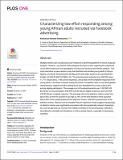Files in this item
Characterizing low effort responding among young African adults recruited via Facebook advertising
Item metadata
| dc.contributor.author | Olamijuwon, Emmanuel Olawale | |
| dc.date.accessioned | 2021-05-17T10:30:08Z | |
| dc.date.available | 2021-05-17T10:30:08Z | |
| dc.date.issued | 2021-05-14 | |
| dc.identifier | 274213416 | |
| dc.identifier | 4e9e1782-60a2-48d9-a437-ab266467b14b | |
| dc.identifier | 85106288731 | |
| dc.identifier.citation | Olamijuwon , E O 2021 , ' Characterizing low effort responding among young African adults recruited via Facebook advertising ' , PLoS ONE , vol. 16 , no. 5 , e0250303 . https://doi.org/10.1371/journal.pone.0250303 | en |
| dc.identifier.issn | 1932-6203 | |
| dc.identifier.other | crossref: 10.1371/journal.pone.0250303 | |
| dc.identifier.other | ORCID: /0000-0002-6109-8131/work/93894962 | |
| dc.identifier.uri | https://hdl.handle.net/10023/23198 | |
| dc.description | EOO was partially supported by the National Research Foundation (NRF) doctoral scholarship grant (number: 118772). The funder had no role in study design, data collection and analysis, preparation of the manuscript or the decision to publish the study findings. | en |
| dc.description.abstract | Multiple studies have successfully used Facebook’s advertising platform to recruit study participants. However, very limited methodological discussion exists regarding the magnitude of low effort responses from participants recruited via Facebook and African samples. This study describes a quasi-random study that identified and enrolled young adults in Kenya, Nigeria, and South Africa between 22 May and 6 June 2020, based on an advertisement budget of 9,000.00 ZAR (US $521.44). The advertisements attracted over 900,000 views, 11,711 unique clicks, 1190 survey responses, and a total of 978 completed responses from young adults in the three countries during the period. Competition rates on key demographic characteristics ranged from 82% among those who attempted the survey to about 94% among eligible participants. The average cost of the advertisements was 7.56 ZAR (US $0.43) per survey participant, 8.68 ZAR (US $0.50) per eligible response, and 9.20 ZAR (US $0.53) per complete response. The passage rate on the attention checks varied from about 50% on the first question to as high as 76% on the third attention check question. About 59% of the sample passed all the attention checks, while 30% passed none of the attention checks. Results from a truncated Poisson regression model suggest that passage of attention checks was significantly associated with demographically relevant characteristics such as age and sex. Overall, the findings contribute to the growing body of literature describing the strengths and limitations of online sample frames, especially in developing countries. | |
| dc.format.extent | 24 | |
| dc.format.extent | 1174839 | |
| dc.language.iso | eng | |
| dc.relation.ispartof | PLoS ONE | en |
| dc.subject | G Geography (General) | en |
| dc.subject | H Social Sciences (General) | en |
| dc.subject | DAS | en |
| dc.subject.lcc | G1 | en |
| dc.subject.lcc | H1 | en |
| dc.title | Characterizing low effort responding among young African adults recruited via Facebook advertising | en |
| dc.type | Journal article | en |
| dc.contributor.institution | University of St Andrews. School of Geography & Sustainable Development | en |
| dc.identifier.doi | https://doi.org/10.1371/journal.pone.0250303 | |
| dc.description.status | Peer reviewed | en |
This item appears in the following Collection(s)
Items in the St Andrews Research Repository are protected by copyright, with all rights reserved, unless otherwise indicated.

